Sports
The NFL embraces LGBTQ+ inclusion ahead of Super Bowl LVI
“LGBTQ athletes need to see more stories of athletes like them supported by their teammates because many are accepted just as they are”
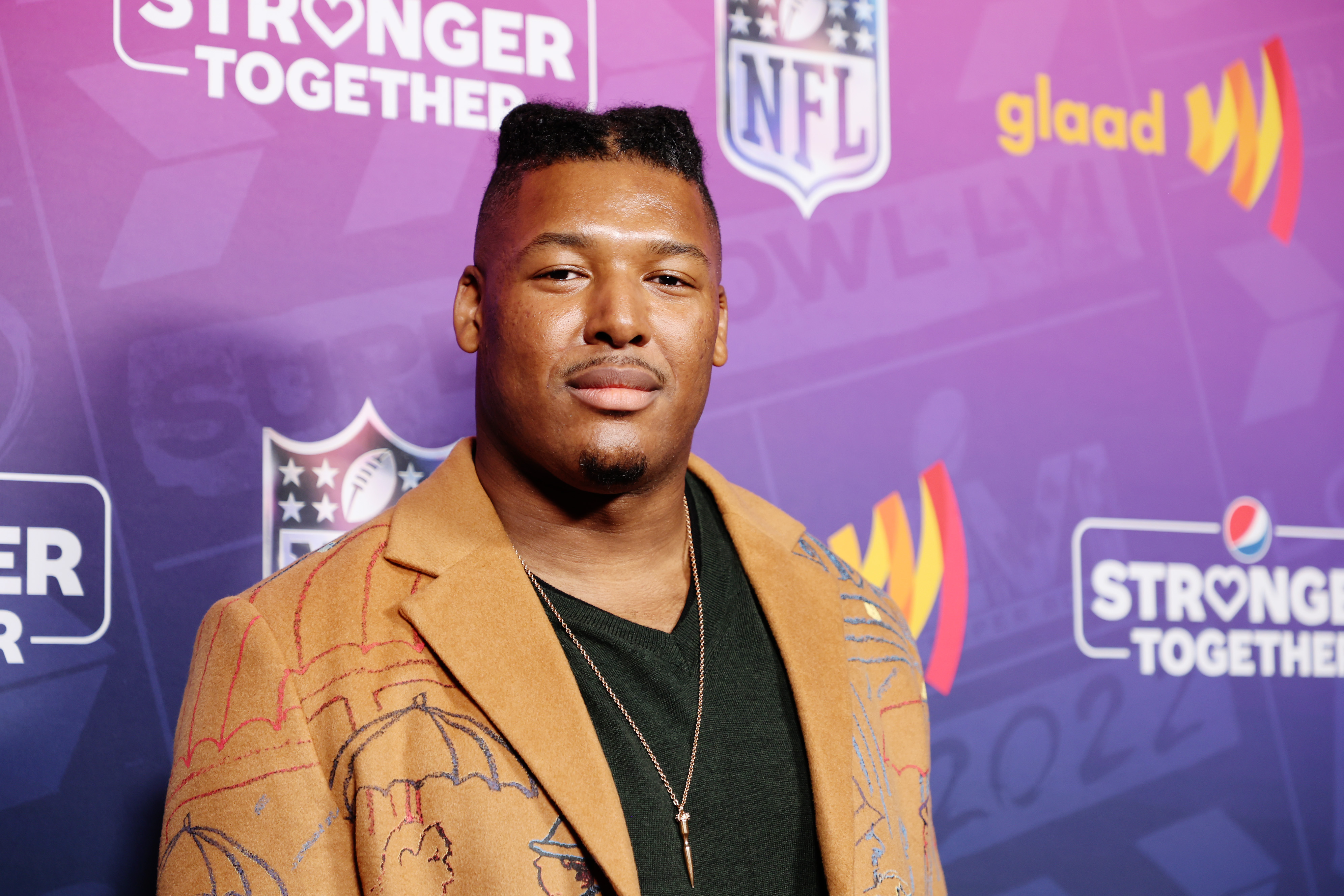
LOS ANGELES – LGBTQ+ History was made Thursday night atop the National Football League’s Los Angeles headquarters rooftop, overlooking the glittering new SoFi Stadium, site of Super Bowl LVI, as about 150 NFL players, sports professionals and fans mingled with supporters of GLAAD to celebrate the league’s now very public embrace of the LGBTQ+ community.
GLAAD and the National Football League (NFL) hosted ‘A Night of Pride,’ sponsored by Pepsi Stronger Together, at SoFi Stadium in Inglewood California.
Jonathan Beane, Senior Vice President, Chief Diversity & Inclusion Officer at National Football League (NFL) welcomed the crowd and minced no words.
“This is long overdue, isn’t it?” he exclaimed, referring to the league’s commitment to the LGBTQ community. “This (event) is just the beginning; there’s a lot more that we’re going to do as a league.”
LGBTQ community icon and LA Dodger Baseball team owner Billy Jean King, the first female athlete to receive the Presidential Medal of Freedom, for instance, has been selected as a Legendary Coin Toss Captain on Sunday.
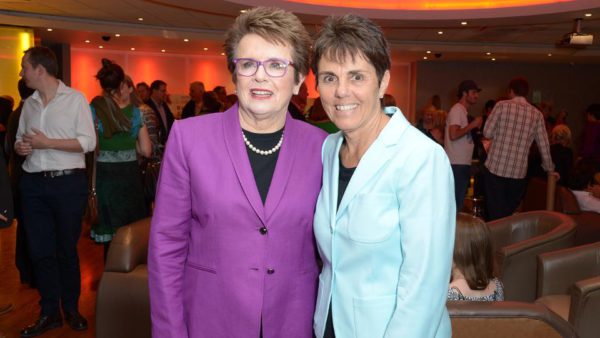
(Photo courtesy of Major League Baseball Inc/The Los Angeles Dodgers)
“LGBTQ athletes need to see more stories of athletes like them, who are supported by their teammates, because so many of them are accepted, just as they are,” GLAAD Deputy President and COO Darra Gordon said in her remarks. “I hope young LGBTQ athletes see posts from tonight and know that they have a rightful place to be out in the NFL, in football, in sports, and at any cultural milestone they aim for.”
LZ Granderson, host of the ABC News podcast ‘Life Out Loud with LZ Granderson, moderated a discussion of LGBTQ inclusion in the NFL featuring out NFL Legend Ryan O’Callaghan and NFL free agent R.K. Russell, who came out as bi in 2019.
R.K., aka Ryan Russell, who is one of more than 20 players in NFL history to come out as gay or bisexual (with Michael Sam and Carl Nassib, he is one of three to do so before retiring) and O’Callaghan (who played six seasons with the NFL retiring in 2012) tackled the hard stuff.
O’Callaghan says, in his day, he never imagined a moment like this would be possible, “not a chance in hell” that there could ever be such a full on embrace of LGBTQ identity and players by the NFL.
“Back then” he said, “they didn’t do anything much at all. Especially not publicly. Up until the last few years, the NFL was absent (on LGBT issues).”
O’Callaghan, who came to the GLAAD event from the prestigious annual NFL Honors awards that bestows MVP Award, Players of the Year, etc, reported significant news of a very public LGBTQ moment.
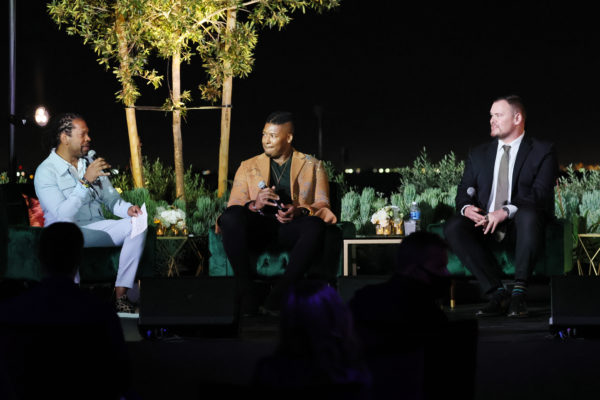
(Photo by Mike Coppola/Getty Images for GLAAD)
During the Honors event, the LGBTQ community was also honored with a video montage of thanks from out gay and bisexual players, honoring Carl Nassib.
“A few months ago we filmed a piece for the NFL Network for their 360 show talking about LGBTQ in sports and the work of the Trevor Project. They had another player, Michael Irving — his brother is gay — and four us (from the NFL 360 segment) appear (tonight) onstage.”
They received a standing ovation.
“It was very powerful,” he said, “a big step for the NFL to broadcast that to America.”
“What they did tonight was a whole other step,” O’Callaghan said of the world wide television broadcast.
Moderator Gunderson seized the moment with an obvious question: “Are we done or is this like the Obama moment where we got the Black man in the White House but racism is still hanging around.”
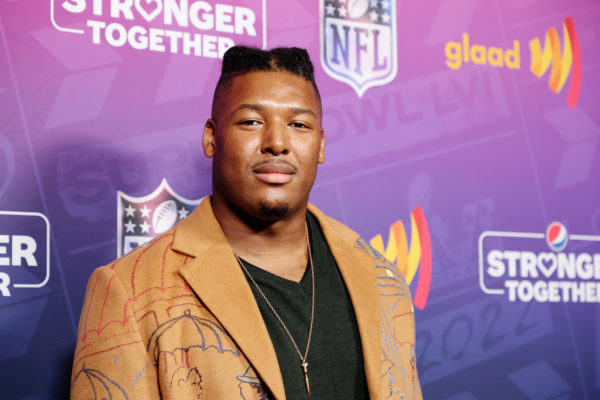
Russell jumped at the chance to answer, saying “Things are certainly accelerating. As a generation of sports fans, as writers, as journalists, as athletes, we want to see ourselves in the game because we’ve always been there, because we built this game — honestly.”
“With the Black Lives Matters movement, seeing players really take a stand we know we are more than just these athletes. We are more than these titles. When we step off the field, we take those helmets off, I am a Black man and I am a bi-sexual man. That carries with me everywhere I go. I don’t have to wear a jersey for that.”
“But when I do wear that jersey you need to know that and respect that. You can either ride with me or not,” he said, adding “I think we’re just getting started.”
“But,” moderator Granderson ominously asked, “Where are we going?”
“We’ve got a race issue still in the NFL,” he continued. “If a league that is 70 percent openly Black can’t confront racism issues then how do you think a league that has one openly gay player has addressed its homophobia issues?”
“I think that’s where the community, the writers, people like us keep the league accountable as well,” said Russell. “It’s about holding them accountable and we need to see that from everybody — players, coaches, staff, journalists, fans. Keep the NFL to its word.”
Russell said that Covid downtime had helped people realize that “surface level, performative” actions are not enough.
“That’s not going to cut it anymore,” he said. “We want to see Black head coaches, we want to see out players, we want to see it in the media, on the field, we want to see you actually do the things you say you’re going to do.”
Asked if he felt the LGBT highlight moment during the evening’s Honors award was performative or a significant step forward, O’Callaghan said he felt “it was genuinely sincere” and that while it was perhaps the most significant thing the league had done to date, it was not the only thing.
O’Callaghan talked about the league’s sponsorship of New York’s Heritage of Pride and float entries into its parade. “They started with small things like that and doing things on social media and the NFL network, changing the logo during Pride month and sharing that on social media.”
“Now it’s kind of expected.,” O’Callaghan said. “The hardest thing was the first step.”
“Doing what they did tonight at Honors, and this party…I’m sure they will be participating in the parades again this year,” he said.
O’Callaghan pointed out that in 2021 the NFL and the Arizona Cardinals owner Michael Bidwill sponsored the National Gay Flag Football Super Bowl in Tempe. “It means the world to have the NFL and a team owner supporting LGBT players and fans,” he said.
Of course the evening was wrapped around the Super Bowl, an event that may champion triumph over adversity but also, famously, a commercial opportunity that has in recent years also found marketers paying millions of dollars for seconds long TV commercials that often celebrate cultural issues.
GLAAD’s Visibility Project, a program dedicated to growing LGBTQ inclusion in advertising, announced today that LGBTQ people and issues will be nearly invisible during Super Bowl LVI ads, with only one ad that expressly features LGBTQ people or issues released prior to the Sunday broadcast. The ad for the Google Pixel 6 features a queer couple.
Additionally, Vrbo will air a LGBTQ-inclusive pre-game ad. In 2020, at least-eleven LGBTQ-inclusive ads from Amazon Alexa, Budweiser, Doritos, HGTV, Microsoft, Olay, Pop Tarts, Sabra, Tide, TurboTax, and Under Armour aired during Super Bowl LIV. In 2021, at least four LGBTQ-inclusive ads from M&M’s, Michelob ULTRA, Logitech, and Paramount + aired during Super Bowl LV. GLAAD will track ads during Super Bowl LVI at GLAAD.org and release a comprehensive list following the game.
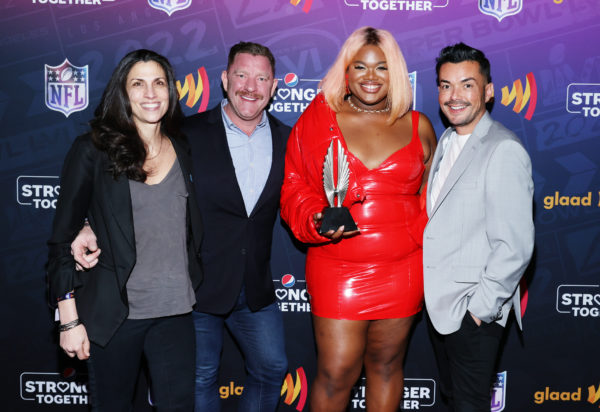
GLAAD Board Chair Pamela Stewart moderated a panel on LGBTQ inclusion in advertising featuring Mohit Jolly, Senior Director of Marketing for the Global Ads Marketing Organization at Google, trans actress model and producer Jari Jones, and Brent Miller, Senior Director for Global LGBTQ Equality at P&G.
P&G’s Miller told the story of an 18 year old youth from North Carolina who sent him a letter praising a 2018 Olympics ad in which out gay Olympic gold medalist Gus Kenworthy’s coming out story was featured, thanking P&G for saving a life.
“Thank you for saving another soul,” he wrote. He said “Something as short as an ad can be life changing,” telling the story of a 54 year old man who described a sense of empowerment watching a Pride flag unfold on an Olympic venue mountainside in South Korea. That kind of marketing, Miller said, is “what we’re supposed to do.”
Miller also said he was particularly proud that his work moves not just a younger generation but the generations before them who fought “so hard and now get to see their work come to fruition.”
Andrew Beaver, an advertising and marketing executive who serviced P&G advertising accounts, agreed with Miller, “I worked with P&G during a time when it wasn’t easy to support our community. They put put their money where their mouth approving LGBT+ inclusive advertising.”
Mojit Jolly, Senior Director for Global Ads Marketing at Google, who grew up in Chandigarh, India, a small, conservative city about five hours north of New Delhi, said he knew early on that something about him was different. “I come from the most intensely conservative background and coming out was not easy.”
He and actress Jari Jones spoke of the necessity for inclusion in marketing and the power of LGBT stories.
Jones said that images of trans people she was exposed to as a young person had set her back but today’s more authentic representations of people like her have changed her life and the lives of millions of people.
Google, said Jolly, recognizes the power of representation and information to transform our lives and highlighted several tools the mega-powered company provides, including LGBTQ safe spaces and LGBTQ business features on maps worldwide.
“Every day we reach billions and billions of people and so we have a responsibility,” he said. “I believe our commitments are profound.”
As the event drew to a close, Big Fredia took the stage and opened with her signature song of affirmation and call to be your true color, the aptly named “Big Dick Energy.”
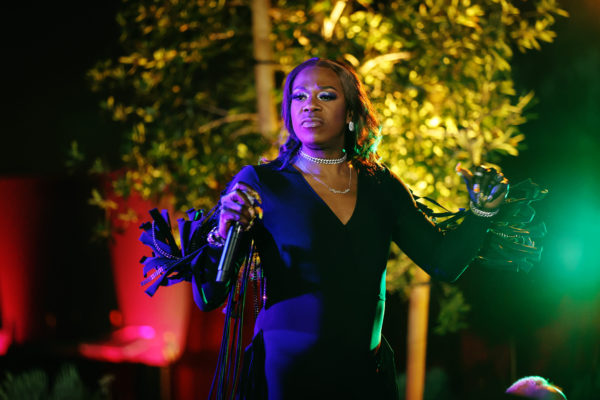
Guests included out NFL Legend Ryan O’Callaghan as well as LGBTQ leaders and allies including Alyssa Milano, Anthony Bowens, August Getty, Big Freedia, Braunwyn Windham-Burke, Jai Rodriguez, Jari Jones, Jeka Jane, Joey Zauzig, Justin Sylvester, Kent Boyd, LZ Granderson, Mollee Grey, Peter Porte, Philemon Chambers, R.K. Russell, Sonya DeVille, Victoria Brito, Cyd Zeigler, Los Angeles Blade Publisher Troy Masters, Andrew Beaver, GLAAD’s Rich Ferraro and Pamela Stewart, Chair of GLAAD’s Board of Directors.
********************
Sports
US wins Olympic gold medal in women’s hockey
Team captain Hilary Knight proposed to girlfriend on Wednesday

The U.S. women’s hockey team on Thursday won a gold medal at the Milan Cortina Winter Olympics.
Team USA defeated Canada 2-1 in overtime. The game took place a day after Team USA captain Hilary Knight proposed to her girlfriend, Brittany Bowe, an Olympic speed skater.
Cayla Barnes and Alex Carpenter — Knight’s teammates — are also LGBTQ. They are among the more than 40 openly LGBTQ athletes who are competing in the games.
The Olympics will end on Sunday.
Sports
Attitude! French ice dancers nail ‘Vogue’ routine
Cizeron and Fournier Beaudry strike a pose in memorable Olympics performance

Madonna’s presence is being felt at the Olympic Games in Italy.
Guillaume Cizeron and his rhythm ice dancing partner Laurence Fournier Beaudry of France performed a flawless skate to Madonna’s “Vogue” and “Rescue Me” on Monday.
The duo scored an impressive 90.18 for their effort, the best score of the night.
“We’ve been working hard the whole season to get over 90, so it was nice to see the score on the screen,” Fournier Beaudry told Olympics.com. “But first of all, just coming out off the ice, we were very happy about what we delivered and the pleasure we had out there. With the energy of the crowd, it was really amazing.”
Watch the routine on YouTube here.
Italy
Olympics Pride House ‘really important for the community’
Italy lags behind other European countries in terms of LGBTQ rights

The four Italian advocacy groups behind the Milan Cortina Winter Olympics’ Pride House hope to use the games to highlight the lack of LGBTQ rights in their country.
Arcigay, CIG Arcigay Milano, Milano Pride, and Pride Sport Milano organized the Pride House that is located in Milan’s MEET Digital Culture Center. The Washington Blade on Feb. 5 interviewed Pride House Project Manager Joseph Naklé.
Naklé in 2020 founded Peacox Basket Milano, Italy’s only LGBTQ basketball team. He also carried the Olympic torch through Milan shortly before he spoke with the Blade. (“Heated Rivalry” stars Hudson Williams and Connor Storrie last month participated in the torch relay in Feltre, a town in Italy’s Veneto region.)
Naklé said the promotion of LGBTQ rights in Italy is “actually our main objective.”
ILGA-Europe in its Rainbow Map 2025 notes same-sex couples lack full marriage rights in Italy, and the country’s hate crimes law does not include sexual orientation or gender identity. Italy does ban discrimination based on sexual orientation in employment, but the country’s nondiscrimination laws do not include gender identity.
ILGA-Europe has made the following recommendations “in order to improve the legal and policy situation of LGBTI people in Italy.”
• Marriage equality for same-sex couples
• Depathologization of trans identities
• Automatic co-parent recognition available for all couples
“We are not really known to be the most openly LGBT-friendly country,” Naklé told the Blade. “That’s why it (Pride House) was really important for the community.”
“We want to use the Olympic games — because there is a big media attention — and we want to use this media attention to raise the voice,” he added.

Naklé noted Pride House will host “talks and roundtables every night” during the games that will focus on a variety of topics that include transgender and nonbinary people in sports and AI. Another will focus on what Naklé described to the Blade as “the importance of political movements now to fight for our rights, especially in places such as Italy or the U.S. where we are going backwards, and not forwards.”
Seven LGBTQ Olympians — Italian swimmer Alex Di Giorgio, Canadian ice dancers Paul Poirier and Kaitlyn Weaver, Canadian figure skater Eric Radford, Spanish figure skater Javier Raya, Scottish ice dancer Lewis Gibson, and Irish field hockey and cricket player Nikki Symmons — are scheduled to participate in Pride House’s Out and Proud event on Feb. 14.
Pride House Los Angeles – West Hollywood representatives are expected to speak at Pride House on Feb. 21.
The event will include a screening of Mariano Furlani’s documentary about Pride House and LGBTQ inclusion in sports. The MiX International LGBTQ+ Film and Queer Culture Festival will screen later this year in Milan. Pride House Los Angeles – West Hollywood is also planning to show the film during the 2028 Summer Olympics.
Naklé also noted Pride House has launched an initiative that allows LGBTQ sports teams to partner with teams whose members are either migrants from African and Islamic countries or people with disabilities.
“The objective is to show that sports is the bridge between these communities,” he said.
Bisexual US skier wins gold
Naklé spoke with the Blade a day before the games opened. The Milan Cortina Winter Olympics will close on Feb. 22.
More than 40 openly LGBTQ athletes are competing in the games.
Breezy Johnson, an American alpine skier who identifies as bisexual, on Sunday won a gold medal in the women’s downhill. Amber Glenn, who identifies as bisexual and pansexual, on the same day helped the U.S. win a gold medal in team figure skating.
Glenn said she received threats on social media after she told reporters during a pre-Olympics press conference that LGBTQ Americans are having a “hard time” with the Trump-Vance administration in the White House. The Associated Press notes Glenn wore a Pride pin on her jacket during Sunday’s medal ceremony.
“I was disappointed because I’ve never had so many people wish me harm before, just for being me and speaking about being decent — human rights and decency,” said Glenn, according to the AP. “So that was really disappointing, and I do think it kind of lowered that excitement for this.”
-

 Baltimore4 days ago
Baltimore4 days ago‘Heated Rivalry’ fandom exposes LGBTQ divide in Baltimore
-

 Real Estate4 days ago
Real Estate4 days agoHome is where the heart is
-

 District of Columbia4 days ago
District of Columbia4 days agoDeon Jones speaks about D.C. Department of Corrections bias lawsuit settlement
-

 European Union4 days ago
European Union4 days agoEuropean Parliament resolution backs ‘full recognition of trans women as women’




















